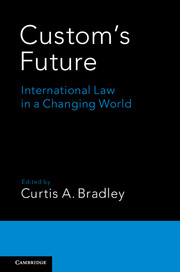Book contents
- Frontmatter
- Dedication
- Contents
- Notes on Contributors
- Introduction: Custom's Future
- 1 Custom's Past
- 2 Customary International Law Adjudication as Common Law Adjudication
- 3 Customary International Law as a Dynamic Process
- 4 Custom, Jus Cogens, and Human Rights
- 5 Customary International Law: How Do Courts Do It?
- 6 Custom's Method and Process: Lessons from Humanitarian Law
- 7 The Growing Obsolescence of Customary International Law
- 8 The Strange Vitality of Custom in the International Protection of Contracts, Property, and Commerce
- 9 The Decline of Customary International Law as a Source of International Criminal Law
- 10 Customary International Law and Public Goods
- 11 Reinvigorating Customary International Law
- 12 The Evolution of Codification: A Principal-Agent Theory of the International Law Commission's Influence
- 13 Custom and Informal International Lawmaking
- 14 Custom's Bright Future: The Continuing Importance of Customary International Law
- Bibliography
- Index
10 - Customary International Law and Public Goods
Published online by Cambridge University Press: 05 February 2016
- Frontmatter
- Dedication
- Contents
- Notes on Contributors
- Introduction: Custom's Future
- 1 Custom's Past
- 2 Customary International Law Adjudication as Common Law Adjudication
- 3 Customary International Law as a Dynamic Process
- 4 Custom, Jus Cogens, and Human Rights
- 5 Customary International Law: How Do Courts Do It?
- 6 Custom's Method and Process: Lessons from Humanitarian Law
- 7 The Growing Obsolescence of Customary International Law
- 8 The Strange Vitality of Custom in the International Protection of Contracts, Property, and Commerce
- 9 The Decline of Customary International Law as a Source of International Criminal Law
- 10 Customary International Law and Public Goods
- 11 Reinvigorating Customary International Law
- 12 The Evolution of Codification: A Principal-Agent Theory of the International Law Commission's Influence
- 13 Custom and Informal International Lawmaking
- 14 Custom's Bright Future: The Continuing Importance of Customary International Law
- Bibliography
- Index
Summary
The protection of global public goods is one of the most pressing challenges we are facing today. The mitigation of climate change is the most prominent example. In the next decades, global warming is feared to cause rising sea levels, melting ice and snow, increasing precipitation, extreme weather events, and widespread coastal flooding. By now, it has been almost universally recognized that these climate changes are at least influenced by human action. Since the early 1990s, the international community has, in principle, recognized this challenge. In 1992, the United Nations Framework Convention on Climate Change (UNFCCC) was concluded at the end of the Rio summit. It has been ratified by 196 parties.
While there are only two international treaties, the Vienna Convention for the Protection of the Ozone Layer and the corresponding Montreal Protocol, which have more ratifications than the UNFCCC, the effectiveness of the Framework Convention has been limited. In the Kyoto Protocol, which was adopted in 1997 and entered into force in 2002, the states agreed for the first time on concrete targets for the reduction of greenhouse gas emissions. Nevertheless, the Kyoto obligations have often been criticized as too modest. But even these modest targets have failed to prevent the significant increase in greenhouse gas emissions during this century. Major actors, such as the United States, have not ratified the Kyoto Protocol, while other states have failed to comply with their reduction goals.
Therefore, progress in establishing a cooperative framework for tackling climate change can, at best, be described as very slow. Some authors have suggested that treaty mechanisms might not be the optimal instrument for climate regulation, as they involve high decision-making costs. Instead, they propose customary international law as an alternative, which might, due to its flexibility, be better suited to the achieve the regulatory goals.
This chapter aims to examine this hypothesis. It explores the potential of customary international law to contribute to the protection of global public goods. The analysis proceeds in the three steps. First, it will have a closer look at the concept of public goods and common pool resources. Economic theory predicts that public goods are usually underprovided and common pool resources overexploited. Experimental evidence confirms the general trend, even though the level of contributions is higher than economic theory predicts.
- Type
- Chapter
- Information
- Custom's FutureInternational Law in a Changing World, pp. 253 - 274Publisher: Cambridge University PressPrint publication year: 2016



